#thanks to this analysis
Explore tagged Tumblr posts
Text
Every time I revisit chapter 86 and the events right after the group talks Marcille down, I'm always struck by this bit here:
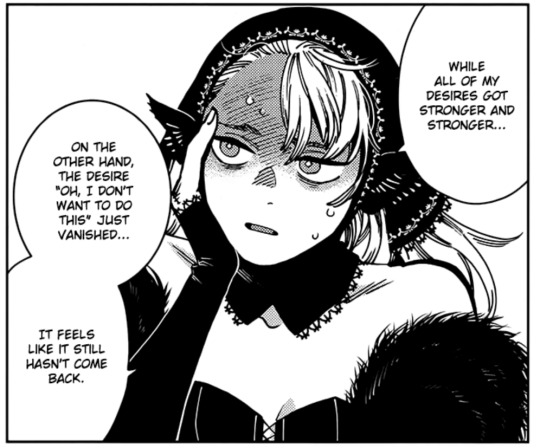
In particular, how similar it is to this:

The Winged Lion ate the same desire in both of them, more or less (I'm sure there are some nuances in both flavor and intent, but they are clearly similar things here). The Lion basically used this technique to kill Thistle, and for Marcille it was... not insignificant, but something she and her friends overcame without even fully realizing it was an obstacle.
I feel like this is another small piece of the story that shows how important support and love are - in navigating mental illness, in dealing with abuse or addiction, or in working through any other similar struggle that can be read into the Lion and his eating of desires.
It almost feels like Marcille was able to borrow the desires of her friends. She loves them and she trusts them, so even when she didn't have a desire to free herself from the Lion, the care they had for her well being still mattered to her.
It's the same thing later, with her hair.

She isn't able to notice the way her messy hair is making things harder, let alone do anything about it. But when Chilchuck points it out and then braids it back for her...
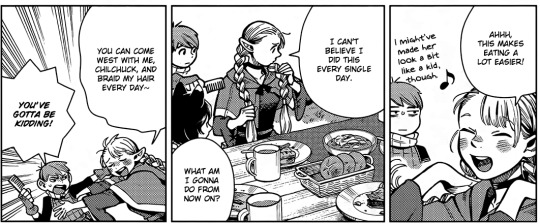
It's better. She likes it, things are easier now. Even though it isn't a desire she can feel for herself, it's not something that doesn't effect her. And because her friends care - because they know her well enough to notice the difference - she is given the chance to have a preference and to ask for their help.
We can obviously see some parallel ideas here with Mithrun and Kabru as well, but I'd also like to point out that Thistle gets this grace, too. Thistle, who had no one to help him up once he lost his will to resist, or to encourage him to find new desires once the Lion ate them all.
Thistle says he doesn't need anything, anymore...
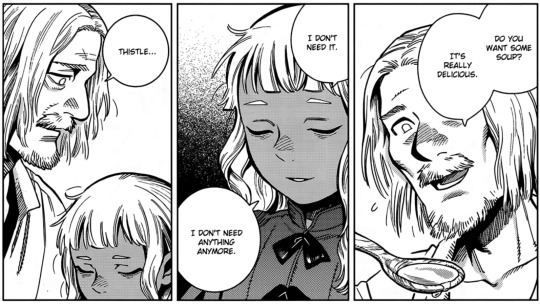
But he is given an apology anyways.

It is not a kindness he desires. It is not a kindness he is able to ask for.
But it is a kindness that helps. It is a kindness that matters.
#dungeon meshi#delicious in dungeon#marcille donato#thistle dungeon meshi#dunmeshi analysis#mfw the foils are foiling..........#people have been killing it w the thistle analysis I am rotating this jester in my head now. thanks. I need to lie down#dungeon meshi spoilers
12K notes
·
View notes
Text
one of my favourite little things about the murderbot diaries is how present all secunit's friends are even if they're not actually physically present. it doesn't do the annoying thing where it jumps through hoops to bring back characters that aren't really relevant to the narrative but it also doesn't do the other annoying thing where it pretends they never existed either. like secunit talks about art and mensah all the time even when art or mensah aren't in the book. it's clear how bharadwaj has impacted its personal growth even when she's literally on another planet. it complains about gurathin and pin-lee when they're not there. it's still sad about miki and don abene and it mentions tapan and maro and rami even though it only knew them for a few days (because when you're new at being a person every interaction with other people is important even if it's short). iris reminds it of mensah. iris also reminds it of ratthi. its hair is fluffy bc it let amena play hairdresser off-screen and it messages her so she knows it's okay. it doesn't have to worry about protecting volescu anymore because volescu retired thank goodness. it's still using thiago's language module. etc etc etc
it's such good writing because it's such a little thing that gives the characterization and relationships greater depth and also reinforces the running theme of friendship in the series and then also subtly gives this sense of 'the people you love are a part of you/your story' and also reinforces secunit's role as a storyteller because it's constantly telling little stories about all its friends.
#theyre good books brent#murderbot#dont mind me apparently when i have an evening nap and no work the next day#i stay up late possessed by a spirit of literary analysis.#oh hell im probably going to have another super nerdy literary dream tonight ffs.#the fact that this has happened multiple times is both sad and embarassing. i know we should all just be ourselves and embrace the cringe#but dreaming about literary analysis is really going too far i think.#if youve read all these tags you should also read the murderbot diaries. thank you and good night.
2K notes
·
View notes
Text
Chuuya's reaction to Dazai getting hurt during the Lovecraft fight has always been so interesting to me...
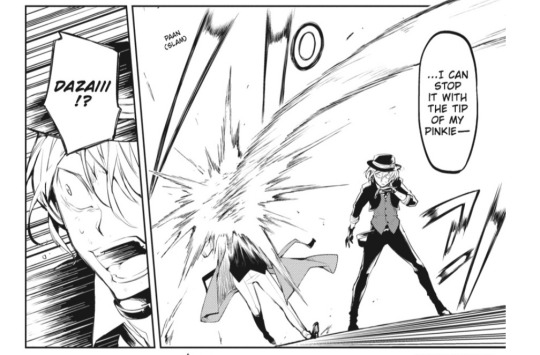
Because it's the kind of worry you'd never expect from a character as gruff as Chuuya, who had displayed nothing but hostility towards Dazai so far. Usually, characters that are labelled as "angry" or "anger issues" (which Chuuya is much more complex than that but you get my point) act more as a tsundere type of way when the one they "don't care about" gets hurt. And show their care in very, very subtle ways (ex. their eyes widen, their mouth parts and closes again, etc) before putting up their front once more.
Chuuya, however, is open, and vocal about it. His worry is clear not only to us, but to Dazai himself, the one he shouldn't be displaying the concern to (as per the cliche). Shouldn't it be some sort of secret that Chuuya does care? Isn't that what skk's dynamic has been shaping up to be until now?
I'm telling you- the way my mind blanked when Chuuya just casually.... showed concern not once, but twice, was a sight to see.
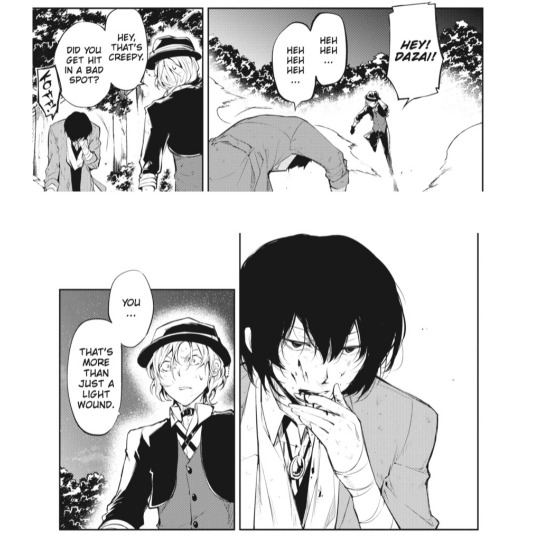
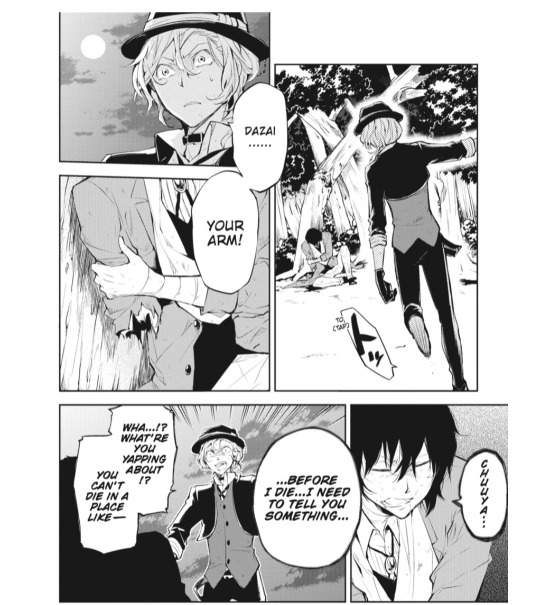
Besides, the context makes it much more confusing, because Dazai isn't some rookie, and Chuuya knows that more than anybody. He was the youngest executive in Port Mafia's history, of course he can handle a hit or two. Of course he'd seen him handle a hit or two, sometimes without batting an eye.
Heck, Chuuya himself was hurling Dazai like a ragdoll in their reunion, which was their last meeting. And you could argue that he was going easy on him, but Dazai has mostly withstood the same damage (as far as I could see), and Chuuya was as bitter as ever.


So that kind of contradicts both what we knew of Chuuya so far, and how their dynamic was shaped to be. I mean, that just makes Chuuya a hypocrite, yeah? What makes him care now, all of a sudden? What makes him care at all?
Well, to me, this backasswards reaction implies one (or more) of the following:
- Dazai rarely got physically hurt during their partnership and thus this is an unexpected thing for him to see (during a mission).
- The four years of separation made Chuuya unsure of how much Dazai can withstand physically now. Also the fact that he isn't in the mafia anymore, aka fighting enemy organizations on the weekly, would naturally make Dazai lose his touch in a way, what prompts Chuuya's reaction.
- Dazai getting taken off guard took him off guard which led to panic. Especially since the situation was (momentarily) out of their depth. Seriously wtf even was Lovecraft?
- During the dungeon scene Dazai was an enemy, while in the Lovecraft fight he was as an ally. The difference might be significant to Chuuya.
- This has always been Chuuya's reaction to Dazai getting hurt regardless of the situation.
- "Only I can hurt him like that" ahh logic
- Asagiri was still experimenting with their dynamic and thus there are some inconsistencies.
This scenario didn't play out again (after their reunion) for me to exactly determine which one is more plausible, but it is 100% canon for Chuuya to shamelessly show his concern and run to Dazai to check on him before properly dealing with their opponent, which I find to be such an appealing layer to their dynamic, and a good spin on the type of character he gets stereotyped as.
Bonus: Dazai also becomes a softy when Chuuya's hurt, especially post corruption. Dead Apple alone displays that multiple times.
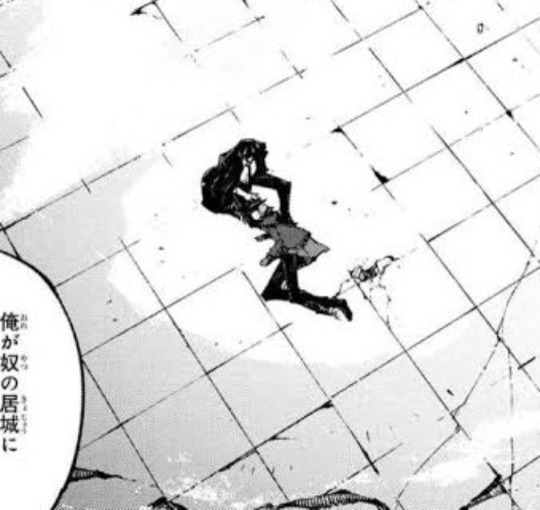
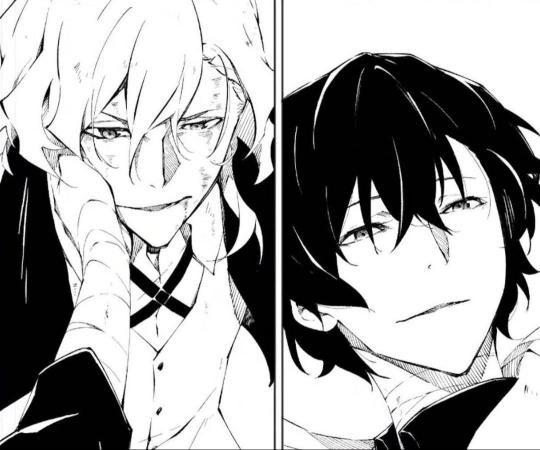
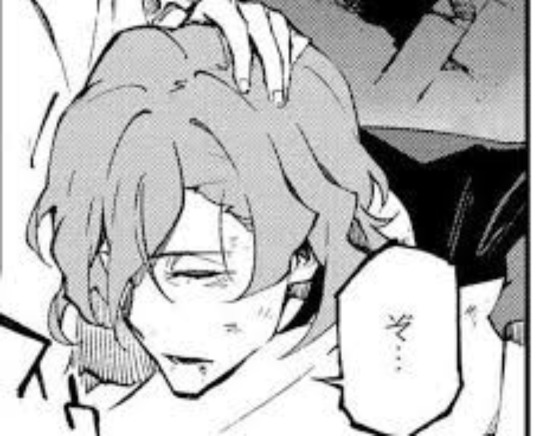
All in all, Skk are doing a terrible job at maintaining their 'hostile' and 'antagonistic' relationship post their reunion. Freaks.
#I was too lazy to scour throgh SB and 15 and find Chuuya getting worried again which might prove the last points#tho I think they're the most unlikely#I love them displaying these sort of things openly#for Chuuya it's just natural to be concerned#it's natural to say 'because I trusted you'#and while Dazai isn't as expressive with his care#he never cowers away from calling Chuuya 'partner' after 4 years#or express that how he saved him was 'beautiful'#these things come so easily for them you wonder why they're even labelled as rivals at all#you *can't* give a clear label on their relationship#friends? they hate each other. Rivals? they care about each other. Partners? they haven't been for 4 years.#each one you put on gets contradicted at one point#and that's the beauty and fun of it#thanks for coming to my TED talk#bsd#bungou stray dogs#chuuya nakahara#dazai osamu#bsd chuuya#bsd dazai#skk#soukoku#bsd analysis#bsd headcanon#bsd headcanons#skk analysis#bsd meta#J's post#J's writing ✍🏽
1K notes
·
View notes
Text
Nuance, Narratives, and Nosferatu
As of today, Robert Eggers' Nosferatu (2024) has only been in theatres for 4 full days; and, coincidentally, that is about as long as I am able to let my thoughts marinate before they demand to be communicated. Before going into any further detail, let it be known that this film was made by freaks for freaks; it exists for the goths, the gays, the monsterfuckers, the historians, and for all those who delight in moral and thematic complexity.
With that being said - spoilers under the cut!
There are two principal narratives running through the flesh of Nosferatu, both of them rooted heavily in the cultural and literary origins of the story. It is a nightmare; it is also an erotic fantasy. It is horrifying, and it is also achingly romantic. From what I've seen so far, the vast majority of discourse that has already emerged around the film is caused by people misunderstanding or deliberately ignoring the relationship between these different lines of analysis; so please trust me when I say, from the bottom of my heart, that this duality is the very lifeblood of the movie.
The reason for that is, quite simply, that Nosferatu is a gothic horror film, set in 1830s German Confederation; and its plot relies on the same (sometimes contradictory) complexities often displayed in Victorian gothic fiction.
From the beginning of the movie, we are given to understand that Ellen Hutter met Count Orlok - the eponymous nosferatu - psychically, when she was very young. They spoke, she pledged herself to him, and was horrified to realize what she had done when he revealed his true visage to her in their first visual (and sexual) encounter.
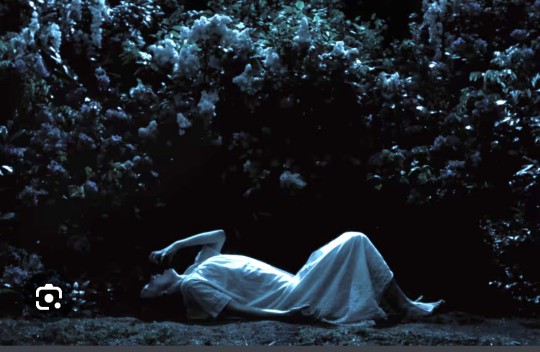
Here, under the lilacs, the paths diverge.
The first reading of the film is perhaps the more straightforward. A young girl is essentially catfished and groomed by a much older, dangerous man. When they meet for the first time, she is a teenager; the lilacs that bloom where it happens become a trigger. He is the source of her madness and "melancholy" (depression), she has nightmares about him regularly enough that her husband is aware of them, and it is implied that she has been institutionalized in the past. Thomas Hutter is the physical representation of her one desperate hope for a normal life - but as the story progresses, she finds herself being denied even that. Orlok's psychic connection with her verges on demonic possession; in chilling, The Exorcist-inspired sequences, she writhes and mutters, prophesying a city-wide reign of death and terror. In pursuit of his claim on Ellen, Orlok terrorizes her husband, murders her friends - and, eventually, she gives her life to take him with her to the grave, saving the city from the plague he caused.
That is the horror element of Nosferatu; it deals with an exploration of childhood trauma, of PTSD, of difficulties maintaining a social life after the fact. It is easy to understand even from a modern viewpoint, and it pushes the film to its conclusion with a bleak, heart-wrenching punch.
The horror is not the only element of Nosferatu.
To contextualize the alternate - though just as correct - reading of the film, it is essential to understand that Ellen’s society was extremely sexually repressed, especially in regards to female and queer sexuality.
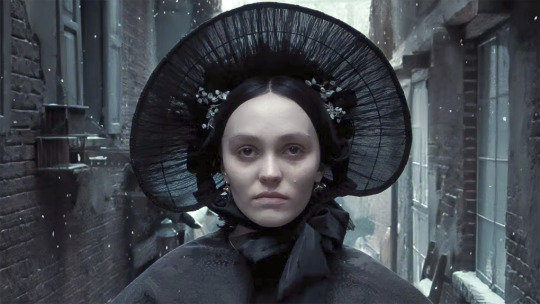
Both were severely medicalized, demonized, and restricted; and as such, when these topics do make an appearance in contemporary fiction, they are often inextricable from disgust and fear.
Dedicated as always to historical accuracy, Eggers maintains the same setting-based narrative coding.
In anticipation of morality arguments vis à vis monstrosity, depiction, and modern purity culture, let me clarify: this is something that works within his chosen genre. Horror, and especially gothic horror, invites a deeper analysis in regard to morality and motivation, and in this case, Eggers' homage to the origins of that genre grounds the narrative in its time and location, as well as fleshing it out much further than a purely modern cultural lens would permit. In this context, the details of Ellen's connection with Orlok become paramount to the understanding of the film.
As bits and pieces of their background become revealed, the audience realizes that her psychic gift did not begin with him - and neither did her melancholy, or her isolation. She was born with her abilities, and throughout her childhood, she was a bit of a tomboy by her contemporary standards, running wild in the woods near her father's property; however, once she foretold her mother's death, and once she was too old to get away with eccentricities, her father became frightened of her abnormality. She was isolated, confined indoors, and that is when her melancholy had begun. Painfully lonely and aching for some form of companionship, she called out into the ether; and Orlok responded.
Over the course of their story, he becomes the physical manifestation of everything Ellen perceives as dark and sinful about herself.
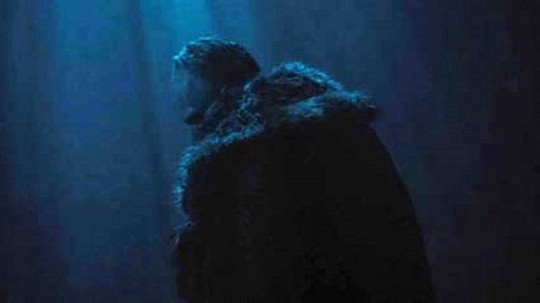
He is psychic, he is vicious, possessive, and blatantly sexual; her sensual affection with Anna parallels the evident and physical attraction he displays towards Thomas; and the social power he so easily commands is the same that she lacks, being a woman in a rigidly patriarchal society.
In the end, the severely questionable age gap, the murders, the coercion, the betrayal - all of that comes down to respect. Throughout the film, that is the one thing that Ellen is consistently denied. She is young when she meets Orlok, yes; but she is aggressively infantilized by her surrounding society even when she is a grown, adult, married woman.
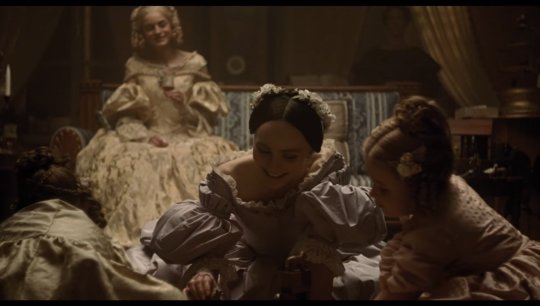
It starts from the beginning of the film, when the Hutters visit the Harding family. During those scenes, the men are shown talking business - while the women play with children in the parlour; and the same social framing persists into the body of the film. When Ellen is suffering from what appears to be some form of mental illness, she is referred to as a child by multiple different characters; and when the condition progresses, she is swiftly diagnosed with hysteria and drugged - thus being forcibly removed from the discussion of her own illness. The general reactions to that illness - which is, in fact, a display of her psychic abilities - range from annoyance to fear to curiosity; it is seen either as a disability or a curse, rather than anything entirely innate to who she is. Her fears are dismissed. Harding tells her to learn some deference. Even closer to the finale, when Von Franz admits that she could have been a great priestess in another age, he does so with pity rather than anything else; in their industrial era, he cannot help but see her only as a tragic sacrifice - horrible, but necessary to save the city from a plague. Brought in to heal her, he instead guides her to her death.
All these aspects of Ellen's circumstances find a direct opposite in her relationship with Orlok. Unlike all other characters in the film, he only ever sees her as his equal, which is made even more evident when his interactions with Thomas and Herr Knock are brought into consideration. With both men, Orlok insists on being addressed by his lordly title, "as his blood demands it"; and yet, Ellen never calls him by any title at all, be it "My Lord" or even a simple "Herr." She argues with him freely, and there is a familiarity between them that he is demonstrated to never tolerate from anyone else. Similarly, while he disguises the covenant he makes with Thomas, the terms of his covenant with Ellen are laid out clearly, in full. He does not hide from her; she already knows the worst of him, the same way he knows that she is intelligent, that she is powerful, and that she is not meant to be demure and deferring. Again and again, Orlok insists that Ellen is not meant for humanity - and the true horror, the horror she cannot bring herself to face, is that he is right.
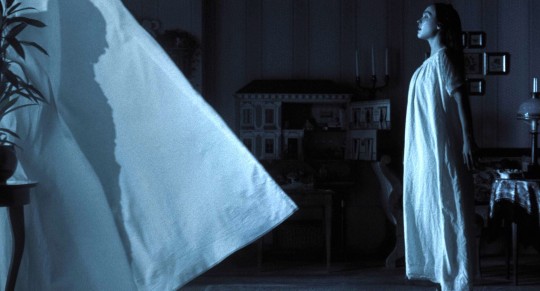
In a sense, he is a mirror held up in front of her own face. Ellen is painfully aware that she does not fit in, and that she never has. The "normal" society, epitomized by the Hardings (wealthy husband, pretty blonde wife, 2.5 kids), has no place for her - and actively dislikes her.
The film makes this ostracism impossible for the viewer to ignore. As the story progresses, it becomes evident that the other human characters - even those that do sincerely care for Ellen - never truly know her. Anna loves her, but wishes she would not talk of dreadful things - and lashes out as a result of that discomfort, scolding her. Sievers finds himself bewildered by her; Knock sees her as an object to trade; Von Franz pities her, Harding hates her, and Thomas cannot truly satisfy her, even after being touched by the supernatural himself.
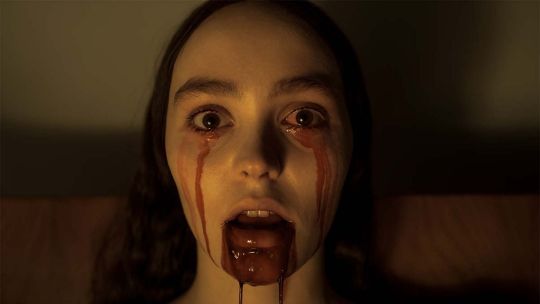
Seeing a flash of a monstrous face while they are together, he flings her away. To him, his experience with Orlok is merely traumatic, and he wishes for nothing more than to leave it behind. However, to her, it is something she cannot help but crave; and she continues to wear her lilac perfume.*
All that to say - Count Orlok is, simultaneously, everything Ellen wants and everything she is terrified of being.
That specific dichotomy reaches its climax during their mutual finale. As it is to be expected from a vampire wedding night, they rejoin in a sequence of sex, blood, and renewed vows - and what is particularly notable is that (unlike Murnau) Eggers makes it clear that this Orlok never intended to kill his Ellen, despite his inability to resist her blood. Though he drinks from her through the night, he stops at cock-crow; and she guides his head back down herself, distracting him long enough for the sun to rise. It is a duet of accident and intention. He drains her; and she holds him as the sun drains him. They cling together as they end - on a bed that serves their wedding and their death.
It is romantic. it is unquestionably romantic. However, that does not mean that the horror isn't also present; Ellen's consent, under these circumstances, is highly debatable, and Orlok is cruel, amoral, and murderously possessive. At the same time, the characters are also acting out folkloric archetypes, with precious little adjustment to that framework - which further removes them from a modern understanding of morality. He is Death, a Koschei the Deathless, a monster; she is the Maiden, a Vasilisa, a damsel. I hesitate to liken them to the Beauty and the Beast, largely because in the original premise of that story, the Beauty falls in love with the kindness that the Beast consistently displays; and it is essential to stress that Orlok has none. He does care for Ellen, in his own way, but he admits to being incapable of love as she defines it in human terms;** and, curiously, that seems to be her primary concern when it comes to the idea of accepting his proposal - rather than all the blood and carnage.
What I'm trying to say, I suppose, is that there are multiple ways of following a story, and multiple different stories in a film as nuanced as Nosferatu. Yes, it is about grooming and trauma. Yes, it is about finding love outside of the cage that is "polite society." I'm sure that it is many other things besides, with as many meanings as there are people in the theatres; after all, I am only one person, and the film grossed something over $40M in its first three days. The point is, really, that this is a story in which a rotting vampire is woken from centuries of deathlike slumber by a lonely voice asking him to be her friend; and whatever these two strange and aching souls do with that can go down any myriad of paths. The film trusts the viewer to interpret the narrative they choose.
* LILAC PERFUME - in fact, it is such a consistent favourite of Ellen's that Orlok smells it on her hair in the locket she sends with Thomas to the castle. Thomas never really learns the reason she likes that scent - even though he knows that preference well enough that he gifts her lilacs in the beginning of the film.
** ORLOK'S OBSESSION - this is a side note, but: the vampire wedding sequence reminds me strongly of the third season of NBC's Hannibal. I suppose that was to be expected, considering that Hannibal is also a Dracula offshoot, much like Orlok himself. When Ellen snaps at Orlok that he cannot love, he responds that "no; but only with you, I can be truly sated." Similarly - "Is Hannibal in love with me?" asks Will; and Bedelia responds - "Could he feel a daily stab of hunger for you, and find nourishment at the very sight of you?" I'd say if you liked that series, you should try and see the film. It works with a familiar blend of aesthetic horror.
#nosferatu#nosferatu 2024#robert eggers#lily rose depp#bill skarsgård#nicholas hoult#nosferatu spoilers#nosferatu analysis#nosferatu movie#willem dafoe#nosferatu meta#gothic horror#horror#horror film analysis#this movie respects its audience's intelligence#and that is everything to me#it doesn't spoon-feed you. it doesn't cave to over-explanation#it allows you to do the analysis yourself and read into the details#everyone say thank you robert eggers
1K notes
·
View notes
Text
IT IS SO IMPORTANT TO ME THAT HYUNA, who was presumably forced to be an Idol for the alien stage and definitely suffered in her past for it, stills wants to sing for other humans even after escaping. She wants to spread music purely for music's sake, to get people hyped up and cheerful, because she loves singing and wants her audience to love singing and see it as smth fun and not just a talent the aliens abuse for sadistic entertainment. She's redefining singing despite how it's treated her and it's kinda beautiful and wholesome.
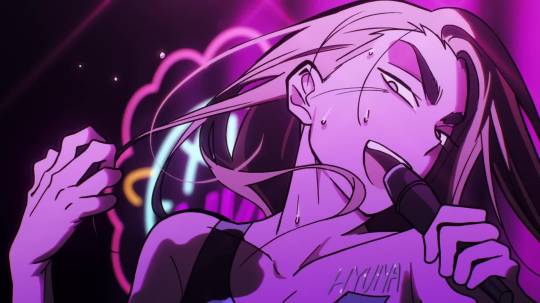
#hyuna#alnst hyuna#alien stage#alnst#vivinos#or maybe I'm reading too much into it#also I really wanna learn the story behind her prosthetic leg#let her be okay 🙏#give it up for the queen the icon the lady of the hour!!!#character analysis#edit: when I made this I hadn't actually seen any of the lore outside of the mvs so no I was not reading too much into it#edit 2: and thank you everyone for making this my most liked post lol!!!!
2K notes
·
View notes
Text
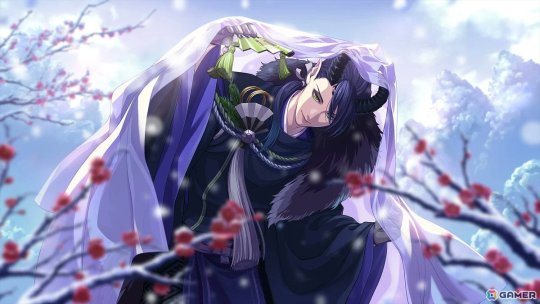
I really appreciate the beauty of Malleus New Year's card. But most importantly, other than its gorgeousness, I also appreciate how it pays so much homage to his status and character, from the flowers, the clothes, and the setting. 🥹
We know that wisterias were prevalent in his Dorm Groovy SSR, this time its another flower which is the red plum blossom here😭❤️
In Chinese philosophy, the Plum tree’s blossom is a symbol of winter ending and a herald of spring. The tree’s pale pink blossoms are cherished because they bloom vibrantly and so bravely amidst the winter chill. They symbolise perseverance and hope, as well as, beauty thriving in adverse circumstances.
The way this flower's meaning is so matched with Malleus' character is so precious. We know he's "the herald of spring" because his birth brought forth a hope that the Draconias(or the faes in general) won't die out just yet (the ending of winter) and the fact that this flower blooms even in winter probably symbolizes the fact that when he was an egg, he was still perservering to live. This also applies to his life as he grows up. With the way even if his life is riddled with loneliness and exclusion, he makes an effort to go out and adjust himself with others, he doesn't give up even if his reality consistently places him in situation where his goals can never be achieved (that is, him being accepted socially and him being ignorant of human culture but still makes an effort to understand it), he just continues to be hopeful that someone/ some place will invite him, therefore his ability to thrive in adverse circumstances.
The way he slowly rises in this card makes me feel like it symbolizes how slow paced Malleus is "in going out/getting used to outside of his comfort zone", actually lol. He described his admission to NRC as him being nervous because its an unknown place but still hopeful for the experiences that he might get(acccording to the vignette of his GloMas SSR), just like him here rising from the snow and the way he lifts the veil which makes me think he wants to see the world outside of his country's point of view with his own eyes.
Japanese tradition holds that the Plum (or ‘ume’) is celebrated as a protective charm against evil, so the ume is traditionally planted in the northeast of the garden, the direction from which evil is believed to come.
I also read this symbolism which makes me tear up lmaooo 😭Because we know in Book 7, Briarland was invaded from northeast where the Silver Owls originated from 💀 The fact that the plum blossom is a protection flower and he's surrounded with it in this card makes me think that it symbolizes how protected he was during Briarland's era 😭and another thing to dissect from his slow rise from the snow with the fact the plum blossom signifies protection is probably the fact that he took so long to hatch despite many people caring for him.
Side note that in Malleus Bloom Birthday Groovy, it implied that he was born in daytime during a snowfall, and he was happy experiencing the winter, just like in this New Years card where he's smiling against the heavy snowfall 🥹
In Japan, plum blossoms symbolize good fortune, an auspicious flower, along with pine and bamboo, and the arrival of early spring. They are often used as the design for New Year’s greeting cards and other celebratory occasions. (And maybe this is just the likely reason why this flower is here in Malleus' card and I'm overthinking it above lol
Next thing I want to mention is his clothes, that attire reminds me of the formal outfit of a Japanese Emperor (From what I searched, its called sokutai, but what Malleus wears is much more simpler I guess, its a outfit derived from it which is called ikan.) This post is a great overview about these two outfits.
Ikan is the work clothes of nobles and government officials in the Imperial Court after the Heian period. Sokutai is a formal costume for those from the Emperor to the court nobles in and after Heian period (Heian costume). Ikan is called 'tonoi (nighttime) costume', whereas sokutai is called 'hino (daytime) costume'. (which probably references the fact that he's a night fae)
The point is, what Malleus wears in this card is a very traditional garment that only high ranking Japanese officials can wear. But what he wears isn't the clothes of an emperor yet, but just for a high ranking official, which is accurate to his status that he's still a crown prince not yet the king, because only Maleficia truly rules Briar Valley right now.
I love the decision that they made him wear such a prestigious outfit because the story of the New Years event is the characters working on customer service lol Its like his clothes is a reminder that he is still highly distinguished even if temporarily he's a worker.
Lastly the VEIL !!!!!! That's the thing that catched my eyes the most in this card lol I KNOW they're not referencing a wedding here because the veil don't look the same, but its so good not to mention that the one of the headress of a Japanese bride is called tsunokakushi and its description can be related with Malleus a lot lol.
The term is a compound of 角 (tsuno, "horn") + 隠し (kakushi, "hiding"). This derivation is listed in some sources as a reference to hiding a bride's "horns" of anger, jealousy, or other negative qualities, in order to present a more virtuous image for the wedding. However, this interpretation might be a folk etymology resulting from a shift in the reading and meaning.
The headdress and the veil aren't the same thing but I kinda feel like this is the idea they're going for considering the veil is 1) hiding his horns, 2) he's a character associated with being jealous, and most importantly, 3) only the person he is looking at can see his face (which is the point of most wedding veils/headdress, to hide the bride's face so that only her partner can see it).
But long veils, like the one Malleus is holding is also just a garment for a noble to hide their nobility. Which is this is probably the likely reason, considering he's using that veil to cover up his horns and his clothes, the most obvious features of his status.
Also, it could be just a fun reference to the fact that Maleficent in live action wore a long veil to hide her horns so that she wouldn't scare the humans lol
#twst#twisted wonderland#disney twisted wonderland#twistedwonderland#malleus draconia#disney twst#twst malleus#lian notes#twst malleus draconia#twst diasomnia#twisted wonderland malleus#malleusdraconia#twisted wonderland headcanons#twst analysis#my ass can never make a simple simping post about him i need to dissect this with all the power my google search image has LKADJFLKS#I AM STILL STANDING WITH MY DELUSIONAL TAKE ABOUT THE WEDDING BIT THOUGH#look the VEIL IS WHITE i knooowww Malleus would pull up in a wedding attire once he catches you referring to him as your wife HEAR ME OUT--#/jk but lowkey not reallya lkfdjlksfd#this is the malleyuu crumb ive extracted from this thank you for reading my ted talk everyone#i really wish i can just put copy pasta down bad captions about this man BUT NO my mind really INSIST i need to make#an analysis essay about him anytime he does something new😭😭😭
571 notes
·
View notes
Text
Orange, Baby!
Rise Ramblings #316
When I think about Mikey, this scene always comes to mind.
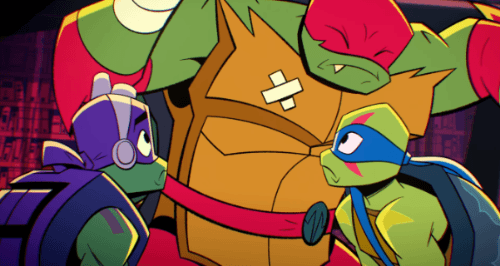
As soon as they step foot in the library to save Mayhem, Angelo instantly disqualifies himself…hilariously.
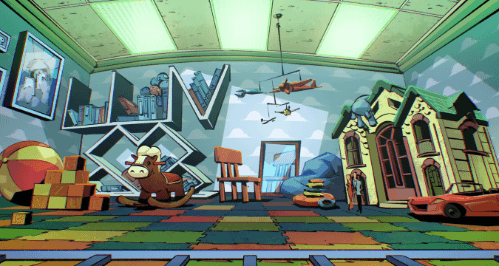
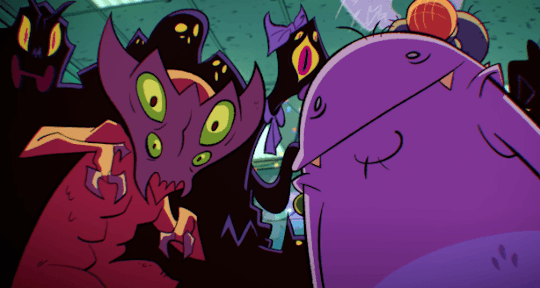
On first watch, I found it interesting that he made this decision with no hesitation, especially given the stakes.
At the time I just resigned to him being a silly silly boy, but now I know better.
Yet, before we get ahead of ourselves, let’s explore who Mikey is.
Michelangelo Hamato is the youngest turtle in the family, and it shows.




Consequently, he seems to possess a certain “youngest brother privilege" that his other brothers just can’t help but reinforce. This is the role that Mikey was born into. Therefore, he doesn’t have to push himself to be the smartest, or cleverest, or strongest turtle.

Instead, he decides to be the artist of the family. He’s a creative! He expresses himself everywhere, from stickers on his own shell, to tagging the lair, as well as on paper. The world is his canvas!
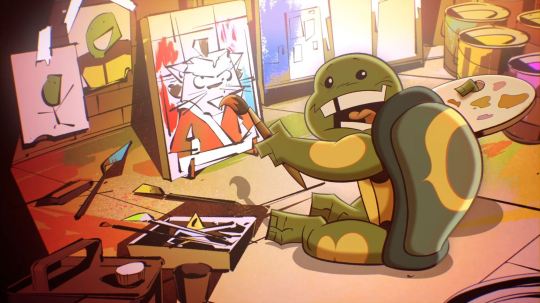
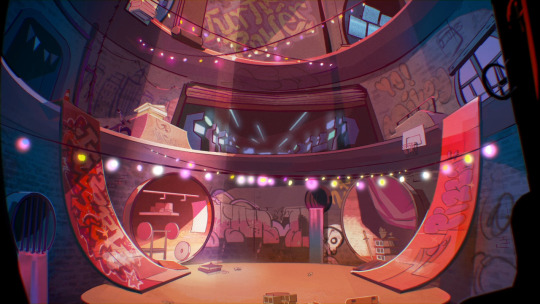
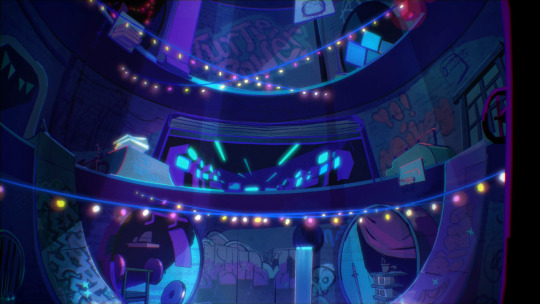
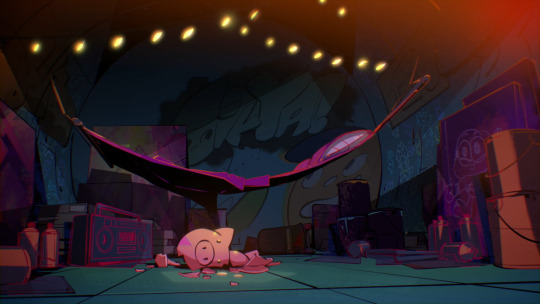
Michelangelo also expresses himself in virtually everything he does, so it’s easy to understand why he’s the most open, honest, caring, and emotionally expressive turtle of the bunch. To some it could be seen as a weakness, yet Mikey uses his emotional intelligence as a pillar of strength, of which he utilizes to uphold his brothers when they need support the most.
In the show, Michelangelo often takes on certain personas; Doctor Feelings and Doctor Delicate Touch. (For some reason, they are all doctors, but that’s beside the point.)
At first glance, the personas could be seen as silly bouts of make-believe. But I think that placing these roles upon himself for his brothers' sake is Michelangelo’s way of helping them cope with the world by offering them what they each individually lack.
For instance, Raph, Leo, and Donnie have trouble voicing their discomforts when someone does something they don’t like.
In other words, they have trouble putting their foot down.
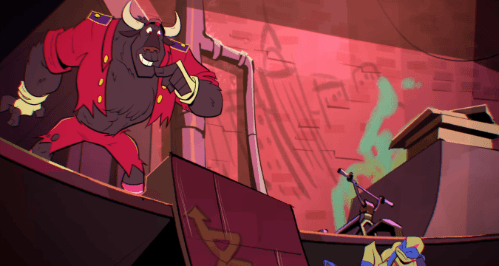
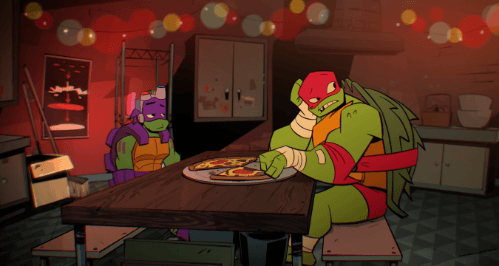
But here is Mikey to the rescue!
Dr. Delicate Touch has no such hang-ups.
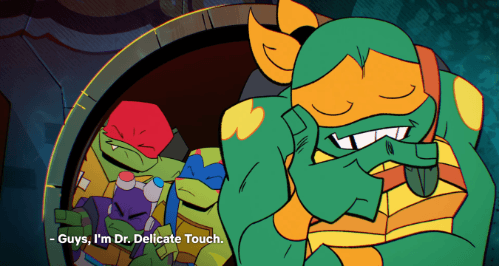
Similarly, when Donatello runs into trouble, as he is unable to recognize his own emotions, it’s up to Doctor Feelings to help his desperate client in need.
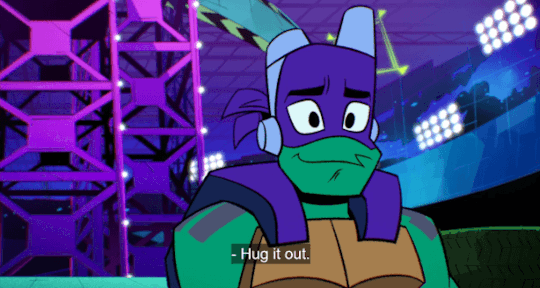
Through taking on these roles, Mikey is able to support his brothers and fill the emotional gaps in his teammates, which, inevitably makes them all stronger.
How is Mikey able to do this and how does he have the strength to take on these roles?
You could think that it’s just in his character, meaning, it’s just how he is. I don’t think so, though. He’s a free thinker, and a creative, but there’s something about these roles that is specifically catered to the needs of his family.
Then I realized, the only reason that Mikey is able to help his brothers in this way is because they first helped him.
Let me explain.
All four of the boys grew up in the same household. Although Splinter tried his very best (there is no Splinter hate here), a single depressed parent doth not a stable child make. Raphael struggled with the burden of his responsibilities as an ad hoc leader (see Being Big Red), Leo struggled with expressing his natural talents as a middle child (see Being Baby Blue), all while Donnie struggled with carving out his place on the team and his feelings of uselessness (see Being Purple Part One and Part Two).
Well, what does Mikey struggle with?
In my humble opinion, nothing.
The struggles of his brothers all related to each turtle coming to terms with themselves and coming to terms with their place on the team.
Yet, due to the love and support of his brothers and father, Michelangelo never had to ask himself if he belonged, struggle with his role on the team, or make huge life-changing decisions that could affect everyone.
Michelangelo is free to just be Michelangelo.
And as a free spirit who is completely in tune with his own emotions, he is able to do things like this:
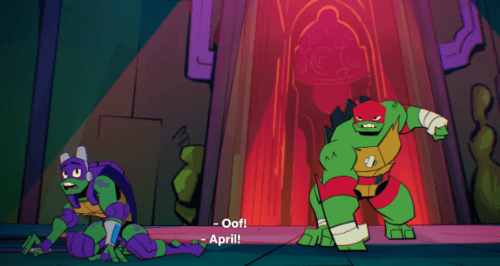
and this,
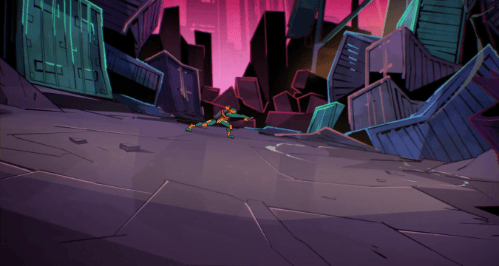
and this.
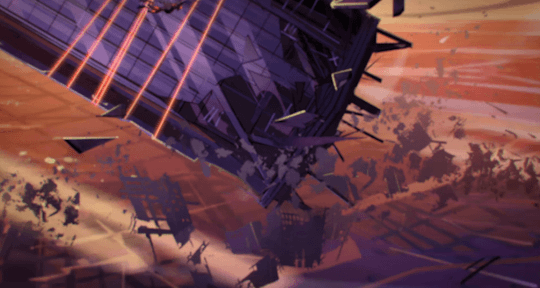
Let’s get back to the scene in the library.
Angelo sees the high stakes of his friend’s pet disappearing forever if they fail but makes the decision to disqualify himself anyway. Why? Because he knows that no matter what he does, it will all be ok.
He has complete faith in his brothers and their ability to solve the problem at hand, so he might as well have some fun.
This not the first time he’s come to this conclusion.
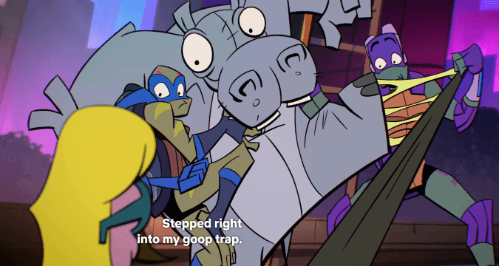
Through out this entire scene, Michelangelo plays in the background.
It’s scenes like this that makes me believe that Mikey’s faith in his family knows no bounds.
Altogether, his brothers and his father were everything he needed to become who he is. Reciprocally, he is free to be everything that they need him to be and more. Over…
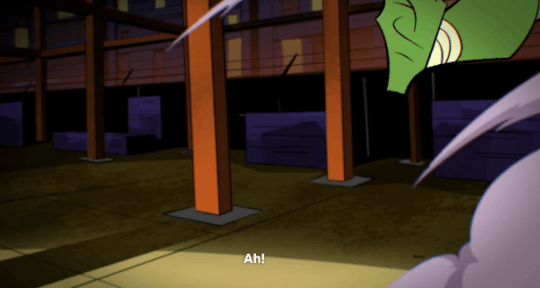
and over,
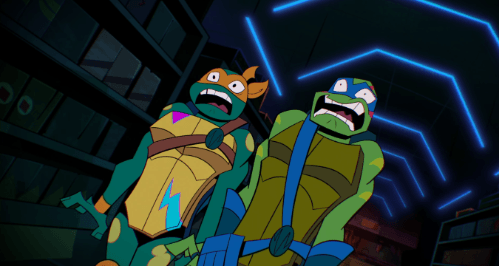
and over again
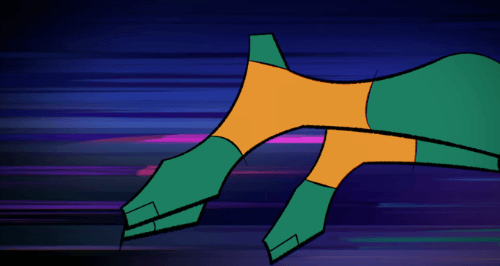
he trusts them completely.
And through this unwavering trust in his family, he is able to trust himself and his instincts. He knows that with everything they’ve poured into him, he can save them from, well, everything. Over…

and over…
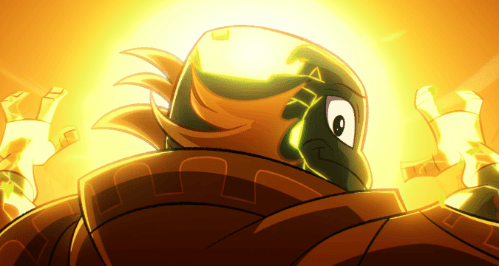
and over again.
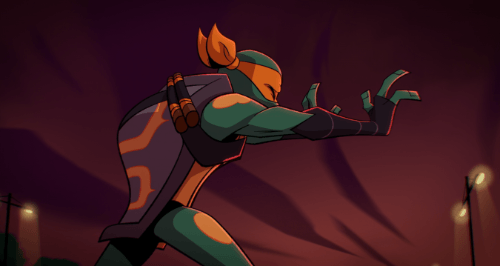
Hence, due to all of this evidence, I believe that through the collective love of his family, Michelangelo became the best version of the Hamato spirit, and thus, the best Mystic Warrior of all time.
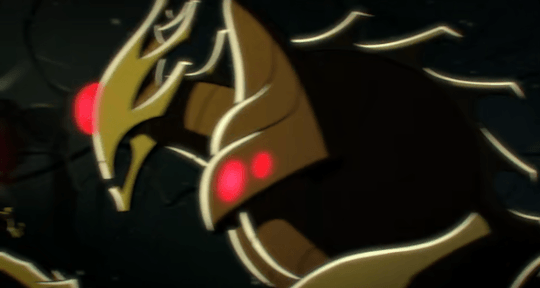
All because, he’s Orange, baby!
○○○○
Previous | Being Big Red • Being Baby Blue • Being Purple ○ Part One • Being Purple ○ Part Two
Finale | Being Hamato Yoshi
#phew!#this post has been a long time coming#thanks for sticking around!#🧡🧡🧡#starkiss ramblings#rise analysis#rottmnt analysis#character analysis#Michelangelo Ramblings#rise mikey#rise michelangelo#mikey#michelangelo#rottmnt michelangelo#michelangelo hamato#rottmnt#tmnt#teenage mutant ninja turtles#rise of the teenage mutant ninja turtles#rise of the tmnt#tmnt2018#tmnt 2k18#tmnt 2018#save rottmnt#unpause rottmnt#unpause rise of the tmnt#save rise of the tmnt#save rise of the teenage mutant ninja turtles
3K notes
·
View notes
Text
Warriors prepared himself for Twilight to die and still isn't over it, an analysis by me
I wrote a ton of analysis posts going into further detail on how uncharacteristically down Warriors was acting in nearly every update since Twilight was first injured, so I'm not going to do super in depth on the stuff prior to the most recent arc, but to recap:

(art cred @/linkeduniverse from Sunset 13)
When Twilight was talking about how he could literally feel himself dying, Wars was like the only one who wasn't horrified, he looked accepting in a way. He's a soldier, he fought in a war, he's very used to death. He tried to keep everything together and help the others as best as he could, and I'm just making an assumption that there was a lot he did behind the scenes to help care for the others when Time was with Twilight and Hyrule in Sunset 14. We see Warriors smile and joke around in Dawn 2 when he sees Twilight is okay, but it seems like followig this initial relief he's a bit more down than usual, he also seems a little tired

(Dawn 3)
The Dawn arc really brought out a much different side of him than we'd seen before, he had lower energy and while previously he'd been screwing around and cracking jokes, we saw him tell Legend and Hyrule in Dawn 7 to stop poking fun of Sky and stop interrupting, which was something he himself had literally done in Regroup


and while Warriors does go back to acting more like himself towards the end of the Dawn arc into where we are now, he sticks VERY close to Twilight in like every update since





I mean he was even the one to bring him his horse in Dawn 9

And in today's update, Central Room 2, him telling Time his whole plan really just seems like HE'S the one who desperately needs to keep an eye on Twilight:



Wars, sweetheart... "If you're that concerned, I could keep an eye on him" king it's okay to be worried about your friend, promise 😭
I just think he really really prepared himself for Twilight to die so that he'd be able to keep himself together and help the others grieve and now that Twilight's NOT dead he's a Bit worried about him, because it's probably hitting him now how terrifying the whole situation was. Like yeah he knew it was bad, that's why he's so stressed out about Wild and is being a bit overprotective of him, but I think the EMOTIONS and the stress are starting to hit him, but he can't suddenly let it slam into him so he's trying to play it off like "it's okay Time i'll watch the rancher" as if he ALSO can't leave Twi alone for two seconds. He's just as bad as Time is lmao
anyways this is all just my opinion i just wanted to share my thoughts, hes my special guy 🫶
#thanks for comin' to my ted talk#i did this instead of a homework assignment on why stress is bad for you...#linkeduniverse#linked universe#lu warriors#lu wars#jes talks#jes analysis
549 notes
·
View notes
Text
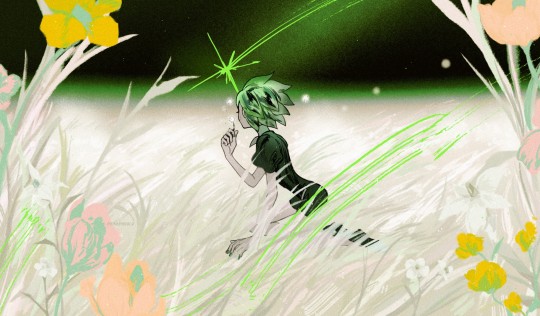
a lifetime of happiness
**hnk ch 108 spoilers**
Can't believe it's already been a month since Houseki no Kuni ended... It's been a ride leading up to the finale but I finished the series with tears welling up in my eyes, and a sense of peace. 😭
The ending was hopeful and meaningful— an unexpectedly lovely conclusion for Phos! 🤧 I love the visual metaphor of Phos and the gems being reborn into "The Pure Land", or known as, The Land of the Lustrous, a purified paradise free of materialism and earthly temptations. These delicate gem flowers holding tiny, unique universes, will be eternally brightened by Phos' radiant existence. With the possibility of other universes, I hope that Phos and the others will meet again and lead more fulfilling lives together!! 🛌💭
The way my jaw dropped realizing Ichikawa ended the last chapter on number 108, the Buddhist symbol of overcoming worldly desires and embracing new beginnings to attain nirvana. SO good...😦 The parallel between big brother and Phos, both on self-destructive, morally ambiguous paths for their loved ones/ideals, was a compelling twist. I love them both... 😢 As Aechmea and Adamant hoped, big brother passed on knowing he helped Phos find happiness. 😭 Wailing...
This series has profoundly impacted me more than I imagined, shaping my perspectives on my own values and the world. Despite it coming to an end, we will always stay connected across time and space, just like Phos!!! 🥺🤍
Thank you, Haruko Ichikawa, for creating such a memorable piece of work, and to everyone who has liked my hnk art and commentaries throughout the years! I'll continue loving and drawing the series for as long as I can. 🙇
#housekinokuni#land of the lustrous#hnk#it was the best possible ending for phos and i love how beautifully depicted the closing chapter was T_T#treasuring it in my heart forever!!!#hnk 108#hnk spoilers#thanks to anyone who follows my other platforms and rereads the same caption lol!#i'd like to eventually compile an more complex analysis now that the series is finished!! maybe after i reread everything <:)#pemprika
1K notes
·
View notes
Note
I think some people miss the fact that Silco loves as hard as he hates. After the fallout with Vander, he had no real friends left. The betrayal, which was not merely a repriortizing of ideals but an outright murder attempt that left him disfigured, may have actually pushed him to become a bigger zealot than he already was.
The betrayal led to hate, that goes without saying, but I'd argue that all of Silco's love also redirected from people (who cannot be trusted) to his ambitions (which cannot hurt him, at least not directly).
I think it's really telling that once Jinx entered his life, Silco loved her more than his ideals. If he had only loved her insofar as she was useful to him, Silco would not hesitate to give her up. We see this was not the case. And, after finally understanding Vander's perspective and likely ruminating on the irony of his impending death, Silco bore no ill will against Jinx accidentally shooting him in a fit of distress. Instead, he affirmed his love for her and tacitly forgives her.
This makes Silco's forgiving of Vander in the au timeline believable. If he found the letter or Vander apologized and told him that the violence was in a moment of passionate weakness, Silco would forgive him provided not too much time has passed to allow resentment to fester. Jinx in the original timeline proves that an abundance of love and forgiveness are in-character for him. He is in fact a character of tremendous extremes.
Sorry for sitting with this for a while, wanted to have the time to answer.
I think this is a very good analysis of Silco, yes. He was never perfect, most likely could be very intense about their plans for Zaun and maybe did not care about if Enforcers got hurt, but that is almost given. He lived in absolute misery and he had clear enemies.
The thing that really made me get Silco was when he was confronting Vander in s1. The way he says "for RESPECT?!" was so telling of his...well, whole deal, the way he looks to the side like he could not believe that Vander didn't get it. He was still fighting the fight but now with trauma! Yay!
I can see him being able to forgive but like you said, there should not be too much time in between the drowning and the forgiveness. The way Vander tried to drown Silco is so violent, I was so taken back by it when I first watched Arcane. It was so clear that Silco could not do anything when Vander got his hands on him, the power difference was too great. He was terrified

And even when Silco tried to escape, leave the situation, Vander attacked again. It's so...cruel?? And that is why I love it. I love how messy they are. They lived among violence their whole life so yes, what's a bit of murder between them if they just talk about it seriously after. And give time to each other.
It's just so juicy that the man who most likely protected Silco his whole life attacked him the cruelest way possible. AND. It gives some nice flavor for Vander. He might be a house wife but he can kill you
#answering stuff#thank you for this nice analysis#gave me the chance to talk about why I love Silco and the whole zaundads toxic situation
808 notes
·
View notes
Text
One thing I adore about the dungeon meshi kelpie arc is how it delineates the difference between “trained” and “tame” SO WELL. Anne the kelpie was nice around senshi, because he fed her and was always respectful. She was trained to not attack him, effectively. But she’s still a monster/wild animal, so the moment he showed “weakness” by trying to ride her, her instincts kicked in and she attacked. And. You’d think Laois, the resident animal lover, would be upset about having to kill a seemingly tame monster. But he suggests it first. He’s not just an animal lover, he’s a biology nerd, SO HE KNOWS ITS UNSAFE TO BE SO BUDDY BUDDY WITH A CARNIVOROUS WILD ANIMAL!
2K notes
·
View notes
Text
jennifer jareau has possibly the WORST case of internalized homophobia/comp het i’ve ever seen in the history of television, like she legit has a coming out scene in 3.17 (they made it about will but WE KNOW what she meant by saying the unsub was targeting gay people because they saw the freedom in their victims they wished they had like BE SO FUCKING FR) also her small town/implied religious upbringing?? another unsub calling her a lesbian in 9.20 for legit no reason?? (jigsaw spewing facts lmao), the whole fight she has with her mom where her mom goes “a daughter who never saw 17 and the other…” and jj is like “the other WHAT mom?” and after a considerable amount of silence her mom replying “…left”, the fact her own family is broken so it’d make sense she would marry the father of her children so she could give them and herself some stability??? pls i could honestly go on and on and on… free my girl from that closet.
#jennifer jareau i know what you are#lesbian jennifer jareau#kinda sorta character analysis#criminal minds#jennifer jareau#jj jareau#btw i adore will i think jj loves him but she’s not in love with him and has never been#anyways#thanks for coming to my ted talk
390 notes
·
View notes
Text
My favourite part of dot and bubble (besides ncuti’s performance in the last scene my god!!!) is that the episode kinda misleads you into thinking Lindy is so dismissive of the doctor and the disappearance of others because of the social media echo chamber she has isolated herself in. That she is scared to leave it and that she could be a better more empathetic person if given the chance to leave.
But then the final scene happens!
All of her actions, from putting Ricky in the firing line before her to lying about it to refusing the help of the doctor because of her thinly veiled racist beliefs, reveal that this refusal to acknowledge the reality around her to the point of putting people in danger and inevitably allowing the problem to become worse was a choice. She was not some innocent victim of media manipulation but had complete agency in her denial of the danger others were and just didn’t care about them.
The reveal is an important part of the episodes critique of social media echo chambers, I think. Their danger isn’t that they obscure information that challenges the users but that they allow people to choose not to be confronted with information that challenges their worldview or their behaviour. Which is an experience vital to developing critical thinking skills and being a compassionate, empathetic human being. But by removing the agency of people who choose not to break from their bubble, we also enable the insularity of these echo chambers!
God I love this episode so much <3_<3
#media analysis#because i felt like it#thank you for coming to my ted talk#doctor who#dr who#dw#dw spoilers#dot and bubble#lindy pepper bean#(fuck her fuck her fuck her)#not in the fun way >:(#social media#echo chamber#social critique#long post
760 notes
·
View notes
Text
Defying God - a parallel between Fyolai and Stavrovensky
The Demons brainrot is taking over, and you know what happens when I acquire a new interest: my brain WILL find a way to connect it to my other interests, whether I like it or not!! And this is essentially what it's about xD I've come here to present a parallel I found between Fyolai (Fyodor & Nikolai from BSD) and Stavrovensky (Verkhovensky & Stavrogin from "Demons" by Dostoevsky). Before I start I want to clarify a few things:
• I don't think these two pairings are similar, I just love picking up any crumbs of connections I can find between my interests, even if it'd count as reaching.
• This interpretation (in either character's case) is in no way "the only true way of looking at it". It's merely one interpretation out of many and I chose to focus on just a few aspects out of the many others there are to explore in these complex characters.
• Feel free to add onto or disagree with anything I say! I'm interested in your thoughts :D
WARNING: There will be spoilers for Bungou Stray Dogs and Demons.
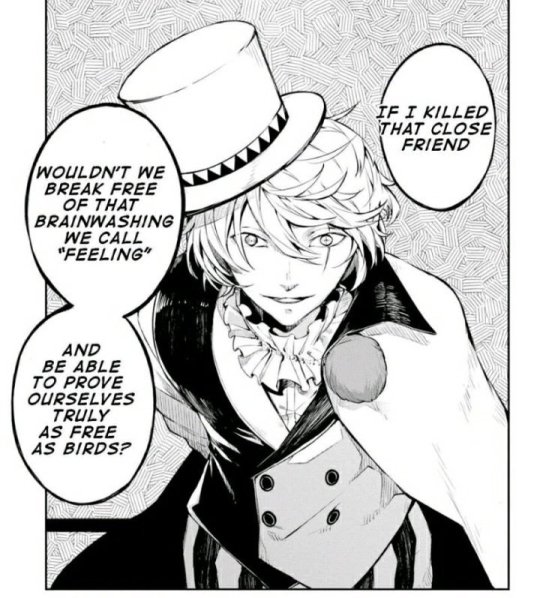
The reason Nikolai wants to kill Fyodor is because he feels affection for him. Emotions are a prison to him, and he basically seeks the opposite of what his emotions make him want to do. Thus, in the face of affection, which makes you want to be closer and wish the best for your friend, he does the opposite and decides to kill said friend, going directly against his feelings in an attempt to prove free will. But here I want to focus more on the "You want to defy God in order to lose sight of yourself" part, specifically the bit about God.
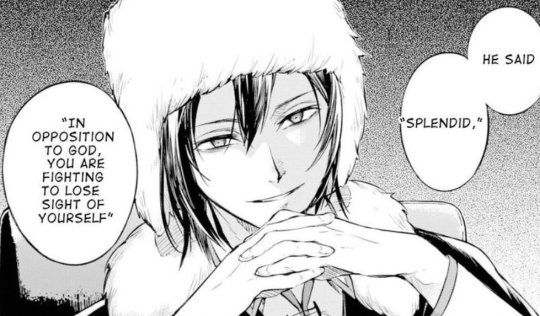
One part of my interpretation is that Nikolai associates God with control. If there is a God who controls all, how can there be a free will? He wants to go against Him and His creations (the human mind, morality, etc.) to prove that it's possible. But God is very abstract - the idea of God is influential but varies depending on cultures, etc. For this point, I'll use the example of the biblical God, or, more specifically, some attributes commonly assigned to the idea of God:
• omnipotence (all-powerful)
• omnipresence (all-present)
• omniscience (all-knowing)
What I am leading up to is the fact that these traits can, in one way or another, be applied to Fyodor. Fyodor's character represents everything Nikolai wants to defy. Nikolai hates control; he wants to fight the idea of God and prove the possibility of complete independence. Fyodor (though not in a "direct" way) could be seen as a symbol for God. He knows everything, he is always present (metaphorically and sometimes literally, the way he spawns sometimes I swear-), and he seems to control everything. Only few people actually see him, but he pulls the strings behind the scenes, and his power is felt everywhere. For Nikolai, to kill Fyodor is not just a protest against his feelings of affection, but can also be a symbolic act of defying "God", of killing "God", by killing Fyodor.
This is supposed to be very symbolic and not taken literally. I feel the need to repeat this because I personally dislike the notion of Fyodor as a literal God (and disagree with the idea of him having a God-complex), so this is merely about the God-like traits he possesses, like a "substitute" for the idea of God, and how it interacts with Nikolai's philosophy. (I've also exaggerated some points for the sake of simplification - for example, I don't actually believe Fyodor is in control of absolutely everything, etc.)
Moving onto Demons:
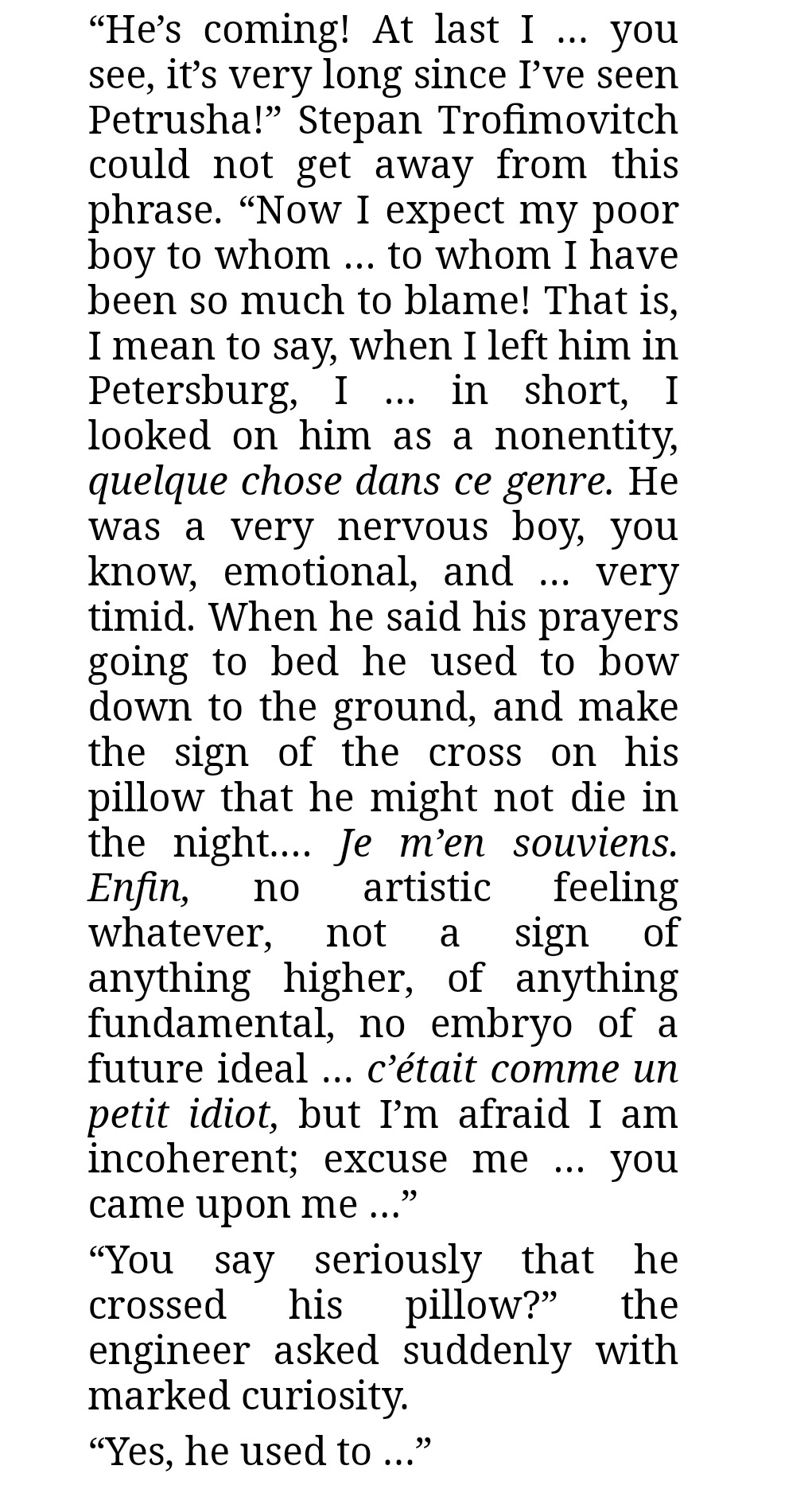
Pyotr Verkhovensky grew up religious and (assuming based on Stepan's description) with a fear of God.
Now he's an atheist and very anti-religious. He plans to overthrow society, and destroying religion + everything it preaches is part of that plan. But interestingly enough, he picks not himself as the official future "ruler", but someone else: Nikolai Stavrogin. He chooses Stavrogin to be the role of the leader in Verkhovensky's ideal society. But not exactly the "leader" in the traditional sense, because he wouldn't necessarily give Stavrogin all the power. He would simply use him as a "pawn" (for lack of a better word) while himself pulling the strings behind said society. With that, Verkhovensky puts someone else above himself, in a God-like position, but he wants to do it while still keeping full control over Stavrogin. By doing so, he would overcome his childhood fear of God because instead of being controlled by God, *he* will control God.
(Same case here, not the literal God, but the character who he assigns God-like traits to.)
I am undecided (with both Nikolai's and Verkhovensky's character) whether this could be read as a solely subconscious intention or if it would make sense as a conscious one as well. Given that both have a different "main" goal (Nikolai focuses on emotions and Verkhovensky on the revolution) I lean more towards thinking it's subconscious (if present at all - like I said, just interpretations!)
It doesn't help that Verkhovensky describes his vision of Stavrogin's leadership as "hidden": Everyone believes in him and his power, but only very few people are said to actually have laid their eyes upon him. When I first read this part, I was honestly reminded of Big Brother from Orwell's 1984, but eventually realised that similar things can be said about God as well.
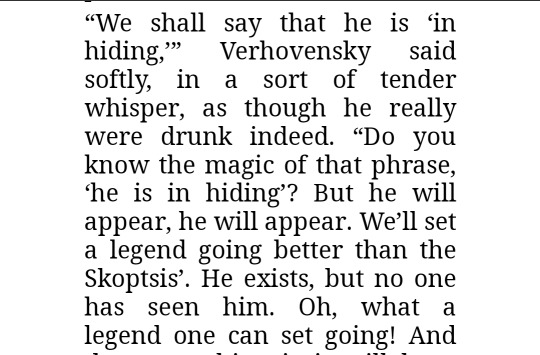
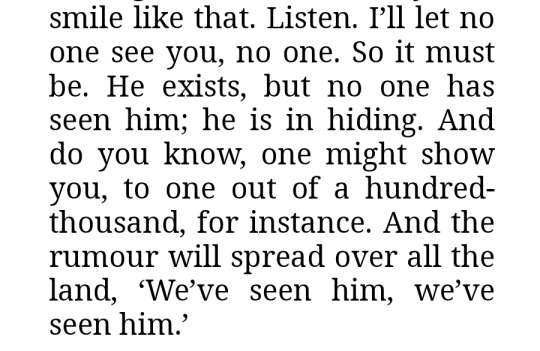

While these are parallels, they don't come without differences. Nikolai needs Fyodor dead, Verkhovensky needs Stavrogin alive. Nikolai wants to kill Fyodor for a sense of freedom, Verkhovensky wants to keep Stavrogin for a sense of control. Yet both symbolic goals are bound to fail:
Fyodor turns out to be unkillable, and Stavrogin ends up dead.
At the end, "God" stays untouchable.
#they make me so ill#I stay up nights thinking about them#fyolai#fyodor dostoevsky#nikolai gogol#bungou stray dogs#dostogol#fyogol#bungo stray dogs#bsd#demons#demons dostoevsky#verkhovensky#pyotr verkhovensky#nikolai stavrogin#Бесы#Достоевский#Верховенский#Пётр Верховенский#Николай Ставрогин#Not a ship post but this sure is fueling my enjoyment of their relationship#I need to dissect and study their dynamic under a microscope#Thank you Dostoevsky#Btw This is my first analysis post here if I'm not mistaken#I'm nervous please be nice#I will draw them now
795 notes
·
View notes
Text
Neve's "the world's not fair on a good day," hits hard. It's so good because Neve feels so soft and vulnerable in this moment. I rewatched this scene recently, and it is so good as a scene that acknowledges Rook's growing feelings for her.
On one layer, there's the captured wisp, captured Rook parallel. I love this part of the scene because she immediately lets the wisp go. Why??? Because it's futile. Just like her trying to hold onto things she can't control. Her letting go of the wisp, is her letting go of her desire to keep things to herself. She's finally ready to let a little chaos into her life by being honest with Rook.
But what's more interesting to me is that she, at every turn, gives Rook the chance to leave. She doesn't want a captured Rook. She can't even bear to keep a mischievous wisp trapped for her sake. That's why it's so good when Rook, at every turn, answers her with a reaffirmation of their commitment to her.
Neve's vulnerability is also so heartfelt in this scene. When she closes her eyes and braces herself for what she's about to say—“What can we ask for?”—it feels like she’s asking for Rook to steady her. To keep her rooted when she feels like she’s being swept away by the storm of her own emotions: her frustration, her loss through Brom, her desire to keep Rook safe, her worry for those who’ve gone missing, and being confronted by her own inadequacies.
I know Rook can answer differently, but I still love the polite/blue!Rook response because it’s the most vulnerable to me. (Granted, different voice actors may have done the inflection here differently, but damn does Bryony Corrigan deliver. Holy hell.)
“Good things happen, Neve.” The way Rook speaks her name like they’re afraid to break this moment, this closeness that Neve allows. Woof.
That’s when my Rook knew there could be no one else.
#neverook#mochi rambles again#dragon age veilguard spoilers#veilguard spoilers#i just rewatched this scene to remind myself of neve's voice and then i had all these thoughts stewing in my head#write fanfic? no write neve analysis part 3 jfc#thank god for brianne battye and for neve's VA jessica clark#neve gallus my beloved
210 notes
·
View notes
Text
i love the criminal minds fandom, none of us is mentally stable but we're really nice people
#thank god i found this serial killer show#i belong here#criminal minds fandom#spencer reid#emily prentiss#aaron hotchner#derek morgan#jennifer jareau#penelope garcia#david rossi#bau#bau team#behavioral analysis unit#criminal minds#whoisspence
726 notes
·
View notes